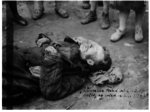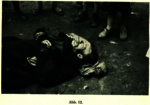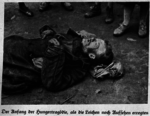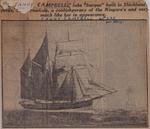Close-up of young man, a famine victim on the streets of Kharkiv
Description
- Mystery Question
- What happens to the famine victims who die in the streets?[Please answer by clicking on the Comments tab]
- Creators
- Alexander Wienerberger, Photographer
- Samara Pearce, Contributor
- Item Type
- Photographs
- Description
- Wienerberger shows the upper body of a young farmer, lying dead on a sidewalk of a residential neighborhood of Kharkiv. He is surrounded by the feet of onlookers -urban residents, judging by the shoes. There is no indication what the people surrounding the victim might do upon seeing this victim. According to the photographer, the fact that this sight has elicited considerable interest may mean that the sight of dead or dying people is still uncommon, at least in this neighborhood.
- Notes
- See entry 012 for another photo of this scene.
- Inscriptions
- “Die Hungertragödie in Südrussland.” [The hunger tragedy in southern Russia.]
- Date of Original
- 1933
- Subject(s)
- Collection
- Alexander Wienerberger: Innitzer album
- Language
- English; German; Russian; Ukrainian
- Geographic Coverage
-
-
Kharkivs’ka Oblast’, Ukraine
Latitude: 49.98081 Longitude: 36.25272
-
- Donor
- Photo source: Album presented by the photographer to Cardinal Theodor Innitzer of Vienna and currently held by the Diözesanarchiv, Vienna, Austria
- Creative Commons licence
 [more details]
[more details]- Copyright Statement
- Protected by copyright: Uses other than research or private study require the permission of the rights holder(s). Responsibility for obtaining permissions and for any use rests exclusively with the user.
- Copyright Date
- 1933
- Copyright Holder
- Samara Pearce
- Copyright Holder Contact Information
- https://www.samarapearce.com/
- Terms of Use
- This item is provided for personal and research use only. You may not reproduce or share its contents in any form.
- Reproduction Notes
- ● Wienerberger, Alexander. Die Hungertragödie in Südrussland: Album presented by the photographer to Cardinal Theodor Innitzer, and currently held by the Diözesanarchiv, Vienna. [1934]. Album cover insert.
Handwritten title on album: “Die Hungertragödie in Südrussland.” [The hunger tragedy in southern Russia.]
● Russland wie es wirklich ist! Wien: Vaterländische Front. 1934, p.7.
Caption: “Mai 1933, Charkow: Einer der ersten verhungerten; sieht der Klassenfeind Proletariats so aus?” [May 1933, Kharkiv: One of the first victims of starvation; is this what the class enemy of the proletariat looks like?]
● Ammende, Ewald, and Alexander Wienerberger. Muss Russland Hungern? Menschen- und Voelker schiksale in der Sowjetunion. Wien: W. Braumueller Universitaets-Verlagsbuchhandlung, 1935, Abb.12.
Caption: “Auch diese Leiche erregt noch Aufsehen.”[This dead body also attracts attention]
● Ammende, Ewald. Human Life in Russia. London: G. Allen & Unwin, 1936, f.p.96. (reprinted in the US with added preface by James E. Mace, as: Ammende, Ewald and James E. Mace. Human Life in Russia. Cleveland: Zubal, 1984.)
Caption: “This famine victim also still attracts attention and pity.”
● Wienerberger, Alexander. Hart auf hart; 15 Jahre Ingenieur in Sowjetrussland,ein Tatsachenbericht. Mit Original-Leicaaufnahmen des Verfassers. Salzburg: A.Pustet, [1939], f.p.129.
Caption: “Der Anfang der Hunger tragödie, als die Leichen noch Aufsehen erregten.” [The beginning of the famine tragedy, when dead bodies were still attracting attention.]
● Wienerberger, Alexander. Collection of Samara Pearce.
Handwritten caption on photo: “Wenn der Feind sich nicht ergibt, so wird er vernichtet” [If the enemy does not surrender, he will be destroyed.]







